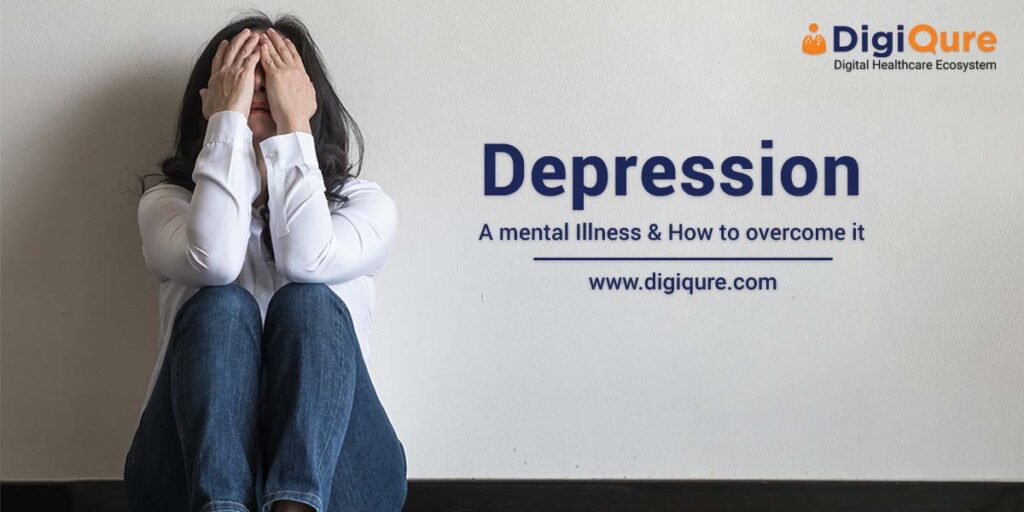Depression is a mental illness that plagues people all around the world. Though it can be challenging to overcome, there are ways to get help and start on the path to recovery. In this post, we’ll discuss what depression is, its signs and symptoms, and how to get help. Depression can be a very debilitating illness, but there is hope for those who suffer from it. With help, anyone can improve their quality of life and start feeling better again.
What is depression?
It is a common mental ailment that causes feelings of sadness, stress and loss of interest. It can lead to a range of emotional and physical problems. In addition, it can decrease a person’s ability to function at work and at home. It is different from feeling down or going through a tough time. It’s more than just a period of sadness. It is a deleterious condition that can profoundly impact all aspects of a person’s life.
Depression Symptoms
Symptoms can include feeling hopeless, worthless, helpless, or guilty; losing interest in activities that were once enjoyed; trouble sleeping or sleeping too much; changes in appetite; and persistent physical problems such as headaches or digestive issues. If you are experiencing these symptoms, you must talk to your doctor or mental health professional. However, with proper treatment, most people with this mental illness can get better.
Incidence
It is a significant public health problem, and its burden rapidly increases in low and middle-income countries. For example, the best available estimates indicate that the prevalence of depression in India is around 4%, with many cases going undiagnosed and untreated.
Depression is a significant risk factor for suicide, which is now the second leading cause of death among young people in India. India’s high rates of depression and suicide are likely to be driven by several factors, including poverty, social isolation, and exposure to traumatic events. In addition, there is a lack of awareness about mental health problems and a lack of access to mental health services. The situation is further complicated because many people seeking help from mental health services are often stigmatized and treated poorly.
Consequences
The consequences of this mental illness are both individual and societal. Individuals with mental illness experience reduced quality of life and increased mortality. At the same time, society bears the economic cost of lost productivity and premature death. To address this problem in India, it is essential to increase awareness about the condition, improve access to mental health services, and reduce stigma.

Treatment for Depression
Many different treatment options are available for it, which can be tailored to the individual. Some common treatments include:
- Psychotherapy: Cognitive behavioural therapy (CBT) is a type of psychotherapy that is effective in treating depression. Psychotherapy focuses on helping people to identify and change negative thinking patterns and behaviours that contribute to their depression. Research has revealed that CBT can be as effective as medication in treating depression and can also help prevent relapses. CBT is usually provided in individual sessions with a therapist. Still, it can also be done in group settings or through self-help books and online resources. If you are considering CBT for your depression, talk to your doctor or mental health professional about whether it is correct.
- Medication: While many different types of medications are available to treat depression, they all have one goal: to help improve mood and functioning. The most usual prescribed type of medication for depression is an antidepressant. Antidepressants increase levels of certain neurotransmitters in the brain, which can help improve mood and alleviate symptoms. Many different types of antidepressants are available, and it is often a matter of finding the right one for each individual. In certain cases, other medications may also be prescribed in addition to an antidepressant, such as a mood stabilizer or anti-anxiety medication. Medication is just one part of treatment, and it is often most effective when combined with therapy and other self-care strategies.
- Exercise: Symptoms of depression can be reduced by doing regular exercise.
- Diet: Eating a healthy diet and ensuring enough nutrients is essential for overall mental health.
- Sleep: Getting enough sleep is crucial for managing depression.
- Support: Connecting with friends, family, or a support group can provide much-needed assistance and social interaction.

Conclusion
Depression is a serious mental illness that should be taken seriously. If you think you may be suffering from depression, please seek professional help with Psychiatrists or doctors who deal in mental illness. Many resources are available to those suffering from depression, and there is no shame in seeking assistance. You are not alone.
References
Rakel, R. E. (1999). Depression. Primary Care: Clinics in Office Practice, 26(2), 211–224. https://doi.org/10.1016/s0095-4543(08)70003-4
Chand, S. P., &Arif, H. (2022, July 18) .Nih.gov; StatPearls Publishing. https://www.ncbi.nlm.nih.gov/books/NBK430847/
Chand SP;Arif H. (2022, July 18). https://pubmed.ncbi.nlm.nih.gov/28613597/
